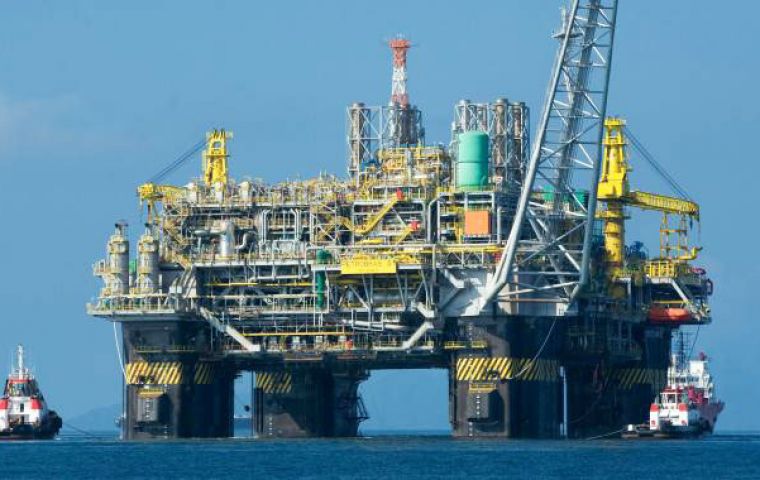MercoPress. South Atlantic News Agency
Brazil’s Pre-Salt Extraction Costs Fall To US$8 Per Barrel
 In June Brazilian oil output rose from May to a daily average of 2.675 million barrels. Production in the pre-salt areas jumped to an average of 1.353 million bpd
In June Brazilian oil output rose from May to a daily average of 2.675 million barrels. Production in the pre-salt areas jumped to an average of 1.353 million bpd By Haley Zaremba from Oilprice - Not too long ago Brazilian state oil company Petrobras was the most indebted oil & gas company in the world. The long-suffering company has faced dire mismanagement while being weighed down by allegations of involvement in Brazil’s widespread corruption. But that’s all changing.
Despite being a subject of the massive Lava Jato investigation, in which executives are accused of accepting bribes in exchange for contracting construction firms at inflated rates, things are turning around for Petrobras. Now, thanks to new management and their recently-discovered pre-salt wells, Brazil is the comeback story of the year.
Discovered only ten years ago, Brazil’s pre-salt area has rapidly become the biggest oil-producing area in the country. Just this week Petrobras discovered commercial oil in a whole new pre-salt area known as the Marlim Sul Field in the Campos Basin, located about 71 miles off the shore of Rio de Janeiro.
Because pre-salt layers are so deep underground (they are the geological layers that were laid before a layer of salt was created by the Gondwana breakup about 600 to 530 million years ago) they are quite costly and difficult to drill in, but hold massive potential for production.
Brazil just announced a fantastic first half, with pre-tax profits reaching US$4.4 billion in 2017, a staggering increase from US$395 million a year ago. This is thanks in huge part to falling production and exploration costs, which dropped by 68%.
In June Brazilian output rose nearly a full percent from May to a daily average of 2.675 million barrels. Production in the pre-salt areas alone skyrocketed to an average of 1.353 million bpd, a growth of 6.4% from May. In July, for the first-time output from the pre-salt wells surpassed the rest of the country’s fields combined.
Now, according to Petroleo Brasileiro SA Chief Executive Officer Pedro Parente, oil is being extracted from the pre-salt offshore wells at the jaw-dropping cost of just US$ 8 per barrel. This is an investment opportunity that has not gone unnoticed, attracting domestic as well as foreign interests to invest heavily in exploration in the previously stagnant market.
The country’s largest pre-salt producing field, known as Lula, is operated entirely by Petrobras, but the Brazilian company only own a 65% stake as part of a consortium including U.S.-based Shell (25%) and Portugal-based Galp (10%). While not a big player at Lula, after Petrobras and Shell, the third biggest oil producer in Brazil is the UK’s Repsol currently producing an average of 81,000 barrels per day.
Despite the strong production rates and accelerated foreign investments in the Brazilian marketplace, there is also concern that depending too much on oil could set Brazil on track to follow in Venezuela's footsteps. Thanks to political instability, growing polarization, and rapid de-industrialization, Brazil is not yet out of the danger zone.
Despite the incredible good fortune of the pre-salt discovery, Brazil’s economy is still volatile. Rio de Janeiro, home of Petrobras, is on the brink of bankruptcy with a myriad of social problems such as skyrocketing rates of drug use, crime, and HIV – not to mention, the state’s former governor is in prison.
While they’ve just reached the incredible production benchmark of US$8 per barrel, parts of the Brazilian oil industry are still languishing. Sete Brasil, a company specifically set up to build floating rigs for Petrobras and others drilling deepwater has gone bankrupt. Petrobras itself is still under investigation for corruption. Lula da Silva, who was president when Petrobras struck gold in the pre-salt area off the coast, was recently indicted on criminal charges by a federal court.
Brazil is on the verge of breaking out of third-world labels and into the limelight. They could be well on their way to being an economic superpower - but only if the government can keep a lid on scandal and learn from the mistakes of Venezuela instead of emulating them.




Top Comments
Disclaimer & comment rules-

-

-

Read all commentsTo sum-up - and irrespective to the excuses & justifications - the Brazilians will continue to pay an absurdly high price for their daily requirements of the fuel consumption.
Aug 14th, 2017 - 01:41 pm 0Maybe better to hang on to the shares, instead of using them as bog roll...
Aug 15th, 2017 - 08:04 pm 0PERHAPS bullock-carts are more economical AND “GREEN”?
Aug 15th, 2017 - 09:00 pm 0Commenting for this story is now closed.
If you have a Facebook account, become a fan and comment on our Facebook Page!